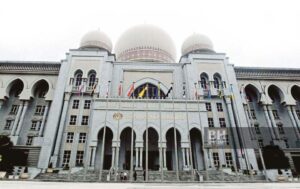By Sharayu Pillai | CodeBlue

The deregulation of liquid nicotine contravenes the right to health that anti-tobacco advocates argued, while not explicitly stated in the Federal Constitution, falls under the right to life.
Edmund Bon, counsel of the Malaysian Council for Tobacco Control (MCTC) and two other health groups, argued that the court ought to give this provision in the Federal Constitution a more liberal interpretation when examining Health Minister Dr Zaliha Mustafa’s decision to remove liquid and gel nicotine from control under the Poisons Act 1952.
Article 5(1) of the Federal Constitution states: “No person shall be deprived of his life or personal liberty save in accordance with the law”.
At last Wednesday’s court hearing of MCTC’s judicial review application against the March 31 exemption of liquid nicotine from the Poisons List, Bon attempted to persuade the High Court to see health as part of Article 5(1) and to argue that the declassification of the addictive substance was, therefore, unconstitutional.
“I want to emphasise the point in which, I think, is sometimes overlooked. Because the degree of intensity and scrutiny that my Lord has to put in a matter that affects constitutional human rights, my Lord, is one that is higher than normal. Meaning, that the range of permissible responses by the government is much more limited and much more narrow than ordinary matters that do not involve constitutional ordinances,” Bon told High Court judge Wan Ahmad Farid Wan Salleh.
“And this principle is called the Anxious Scrutiny Principle that has been adopted way back [in] Rama Chandran,” added the lawyer, referring to the case of R. Rama Chandran v. The Industrial Court of Malaysia & Anor [1997] that gives power to the High Court to scrutinise government decisions for substance.
The Anxious Scrutiny Principle has its roots in the judgement of Lord Bridge of Harwich in the United Kingdom case of Bugdaycay v. Secretary of State for the Home Department, cited by Bon.
Lord Bridge ruled in Bugdaycay that “the court must, I think, be entitled to subject an administrative decision to the more rigorous examination, to ensure that it is in no way flawed, according to the gravity of the issue which the decision determines”. Where the administrative decision under challenge is one which may put the applicant’s life at risk, the basis of the decision must call for “the most anxious scrutiny”.
In addition to Lord Bridge, Bon also relied on the words of Lord Templeman in the same UK case to state that where a flawed government decision might imperil life or liberty, a special responsibility lies with the court in the examination of the State’s decision-making process.
In addition to case law, Bon utilised various international conventions ratified by Malaysia to demonstrate that the constitutional right to life includes a right to health. Bon, in his written submission to the court, stated that Malaysia, as a member of the World Health Organization (WHO), accepted the WHO constitution that recognises health as a human right.
The WHO constitution reads that every human being has the fundamental right to the “enjoyment of the highest attainable standard of health”.
Bon also argued that Malaysia’s ratification of the Convention on the Rights of the Child, the Convention on the Elimination of All Forms of Discrimination Against Women, the Convention on the Rights of Persons with Disabilities, as well as the WHO Framework Convention on Tobacco Control (FCTC) are repeated affirmations of the country’s commitment to protect the right to life.
“Malaysia has repeatedly affirmed its manifest commitment to promote and protect the right to life. Recognising that the right to life is a matter that is given to our citizens under the constitution,” Bon said.
The Federal Court has previously, noted the lawyer, adopted a “prismatic approach”, or generous interpretation of fundamental liberties.
Citing the case of Tan Tek Seng v. Suruhanjaya Perkhidmatan Pendidikan & Anor, Bon pushed forward the principle of a liberal approach to interpretation that was adopted by the late Federal Court judge, Gopal Sri Ram.
“‘In my judgement, the courts should keep in tandem with the national ethos when interpreting provisions of a living document like the Federal Constitution, lest they be left behind while the winds of modern and progressive change pass them by.
“‘Judges must not be blind to the realities of life; neither should they wear blinkers when approaching a question of constitutional interpretation’,” said Bon, quoting Gopal’s judgement in Tan Tek Seng.
The late Federal Court judge stated in his judgement that Article 5 of the Federal Constitution be given a “broad liberal meaning”, and that Article 5 does not refer to a mere existence but incorporates all the facets that are “integral to life itself”.
“I’m inviting, my Lord, to extend the definition of Article 5 for the first time to include the right to health as a right that is logically an integral part of life itself,” said Bon.
The anti-tobacco groups’ lawyer also claimed that the Health Minister completely ignored or failed to mention any of those considerations raised in the court proceedings, particularly the right to health, the rights of children aged under 18, and Malaysia’s obligations under the WHO FCTC framework.
“A matter of tax, my Lord, is not something which should be considered as the primary reason to legalise a poison,” Bon said.
Senior Federal Counsel Ahmad Hanir Hambly, who represented Dr Zaliha in the judicial review, rebutted Bon’s claim that the minister’s only consideration for the removal of liquid and gel nicotine from the Poisons List was taxation.
Ahmad Hanir, citing Dr Zaliha’s October 5 affidavit, submitted that the minister argued that the delisting of liquid nicotine was for the purpose of control via taxation.
“The reason for the introduction of [excise duty] is not for economic reasons. The imposition of tax is actually one of the measures to control cigarettes and tobacco.
“As a matter of fact, in the WHO FCTC’s Article 6, a price and tax measure to reduce the demand for tobacco. The parties recognise that price tax measures are an effective and important means of reducing tobacco consumption for various segments of the population, in particular young persons,” Ahmad Hanir told the Wednesday hearing.
Azeem Amalan, legal counsel for the anti-tobacco groups, was quick to refute the reasoning forwarded by Ahmad.
“Taxation is a control measure, but if the control measure creates another loophole, then it’s an ineffective control measure. The policy makers will have to take a holistic approach to admitting such measures,” said Azeem during his closing statement, arguing that nicotine could be taxed and regulated at the same time.
Decision on the judicial review application has been set for February 7 next year.



